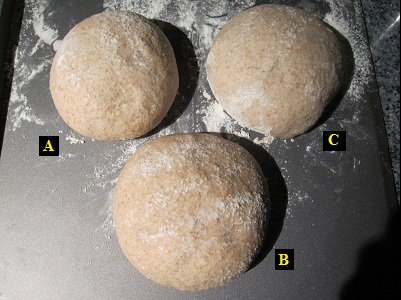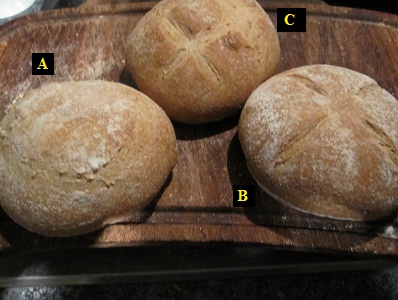Decided it was time for my first foray into the world of sprouting grains. Rather than jump straight into a bake from PR's latest book I decided to conduct an experiment to firstly see if I could actually sprout some grains and secondly to bake some test loaves with different quantities of sprouted flour. Here's how it went.
The Sprouting
Took a bunch of organic spelt grains, rinsed them thoroughly 2-3 times and then put them in a pot and covered with water.
They were left this way for about 5 hours after which time they were rinsed again and then spread out on my baguette trays thus:
I kept these in the oven (more for space than anything else) and with the oven light on to provide gentle ambient warmth. Periodically I sprayed the grains with water to keep them from drying out.
There now followed a longer period than I was expecting. There seemed little or no activity for 2 days. The odd grain started to sprout but not much else. I kept spraying and kept the grains gently warm and waited. By day 3 things had improved greatly and by day 4 I was as far as I dare go since I didn't want to start malting the grains. This is how the grains looked at this point:
This looked perfect. Not fully sprouted but simply "chitted" as DA likes to say.
At this point I rinsed the grains once again and then spread them onto the special plastic sheets that came with my food dehydrator. 3 trays in all and there I dried them at 100 degrees F for a full 12 full hours.
When finished they were crispy dry, and I would guess they were probably drier than the normal organic grains that hadn't been sprouted. Job done !
The Baking
For my experiment with this new sprouted flour I decided to make 3 separate mini-boules with slightly different quantities as follows:
Loaf A - 50g normal spelt, 50g white flour, 66g water, 2g salt, 1g fresh yeast
Loaf B - 50g sprouted spelt, 50g white flour, 66g water, 2g salt, 1g fresh yeast
Loaf C - 25g sprouted spelt, 25g normal spelt, 50g white flour, 66g water, 2g salt, 1g fresh yeast
Nothing special, just 3 simple loaves at 66% hydration, Loaf A being the "normal" benchmark. I was put off doing a 100% sprouted flour loaf due to other people's reports of difficulties. In the event, I honestly think I could have made one without any difficulty and I will try it soon.
The sprouted spelt berries went through the grain mill without incident, just like ordinary berries. I mixed up the loaves and left them to proof and this is where notable differences began, as expected and as documented by others. Loaf B, the one with the most sprouted flour, was clearly proofing ahead of the others and Loaf C was ahead of Loaf A. I was pleased to see this, it meant my sprouted flour was good. Here's a picture of the proofed boules where you can see the difference:

Thus I baked them separately in the order B, C then A as and when they were ready for baking. They all rose in the oven just fine, no problems at any stage with dough structure.

The crumbs were all good and from the shot below you can see the slightly extra height of Loaf B, with the 50% sprouted flour in it.
The Tasting
My wife & I ate small samples of the 3 loaves in the order Loaf A, Loaf B, Loaf C. All the loaves tasted just fine, however we both agreed that loaf B was the best tasting. However, the taste surprised me. I'm not sure what I was really expecting, perhaps too much from all the good things I have read. Loaf B turned out to have the mildest taste of the 3 but at the same time it had it's own unique taste. Regrettably I find myself hopelessly unable to put into any words what that taste was like. I think I need to eat a lot more of it to frame a description. Either way though, the 50% sprouted loaf was our preference.
Summing Up
Was it all worth it? The jury is out here for me at the moment. Yes the loaf tasted better with sprouted flour, but, it took some 4 days to soak, germinate and dry the grains and all that needed space in the kitchen that was frankly . . .inconvenient. On pure taste alone, I would not make grain sprouting part of my weekly regimen, I would certainly do it occasionally but not religiously. However . . . if the additional health benefits and claims of sprouted grains are proven to be correct then I would certainly create my own sprouted flour for all my breads. As mentioned in another recent thread though, I would not buy commercial sprouted flour because at this time it is so ridiculously expensive. Therein lies a significant problem for the future of the "sprouting revolution". Not everyone will have a grain mill or a food dehydrator at home to grind and thoroughly dry the grains. It's a bit of a "faff" all round but if the nutrition and health benefits are there then it's worth it.
For those of you who have already sprouted your own grains, do you know how long the sprouted and dried grains can be stored for at room temp? I understand than once milled it's best to store the flour in the freezer but I'd like to understand how long the sprouted/dried grains will last. If I can make up a large batch and leave them in a sealed mason jar for weeks then I am much more likely to use sprouted grains.
- ElPanadero's Blog
- Log in or register to post comments
I don't know why it took so long to chit the grains? 36 hour max for me to chit spelt and dry it. I think they like 74 F the best ad the oven temp with the light may be too high? Mine goes to 91 F
With SD I can't get 50% sprouted grain through a 12 hour retard in the fridge for the final proof without it tuning to goo and the crumb being gummy.
Happy Sprouted SD baking
hours and no more. You can drown them and kill them off and you want to kep them in the dark as they sprout. Seeds go in the ground and start germinating at much lower temperatures than 98 F. Many places in the world never get to 98 F so seeds have evolved to sprout in a dark, moist environment at lower temperatures. 74-78 is perfect for seeds to germinate.
I don't know it i would iike 100% sprouted grain bread or not but if I make one I'm not going to try and retard it at all. It would be goo for sure. I want to retard for 12 hours and get a 1 hour autolyse for the other whole grains and flour in the mix. and to fit my baking schedule for retarfing overnight and bake the next morning.
I do like 25% sprouted grain in the mix taste wise.
Happy sprouting
I know you would love the 100% sprouted SD I just made. The subtle sweetness is amazing.
I bulk retarded the dough for about 12 hours with no problem. Per the book you don't need to do the bulk retard except for time convenience.
Nice bakes. I need to know why I should sprout grain for my baking. I need hard evidence that sprouted is superior to mitigate the time, taste loss. Otherwise I continue what works and what people like to eat. Flour water salt yeast
It's worth trying. The flavor is amazing. I'm not saying I would only use sprouted flour but it will be in my rotation for sure.
because you make those nice onion cheese rolls. I know you know tasty bread.: )
I bought a lot of sprouted flour but nobody liked the taste so maybe I grind my own when things quiet down.
Maybe home made is better tasting
I hope you try making your own. It's much different than the store bought. I had some store bought from King Arthur Flour and it was nothing like my own.
P.S. just finished a new onion bread.....another keeper I will post soon.
love the comparison between breads, I really am hankering for some sprouted flour but need to get a mill first..... Did you find they tasted very different from your unsprouted flour bakes? I have seen some sprouted flours for sale here but you're right that they're very expensive and I like the idea of doing it all myself at home, even with the time it takes.